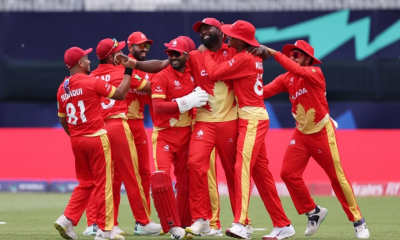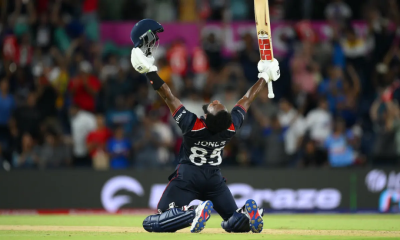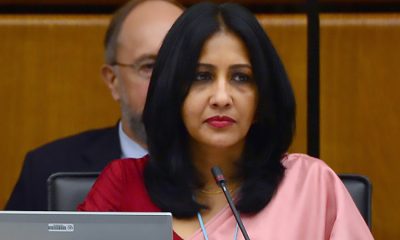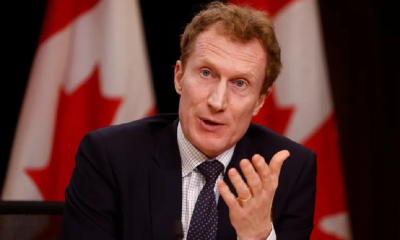Editorial
Guilty until proven innocent?

Monday 2nd October, 2023
There are no signs of an early détente between India and Canada. The two countries continue to trade allegations. Other nations are divided along the lines of strategic alliances rather than anything else. Interestingly, the US government is seen to be tilting towards Canada.
What the ongoing diplomatic row of epic proportions, and Washington’s stance thereon signify is that India has not received full membership of the club of powerful nations. The US firmly stands behind India only when the latter locks horns with China, which the West is all out to keep at bay for economic and security reasons, but when India happens to cross swords with a western nation, it cannot depend on the US to have its six, so to speak. The US has no permanent friends, as has been the experience of Pakistan, which Washington used in the Cold War era and then discarded. Perhaps, the painful diplomatic knock New Delhi has received from Ottawa could not have come without Washington’s knowledge; it could be attributed to strong economic ties India continues to maintain with Russia, refusing to toe the western line over the war in Ukraine. The Indian refineries are reported to have snapped up discounted Russian oil since the West imposed sanctions against Russia.
Canadian Prime Minister Justin Trudeau may not have expected India to strike back with might and main, resorting to tit-for-tat expulsion of diplomats when he went public with his ‘credible allegation’ of India’s involvement in the killing of a Khalistan activist on Canadian soil and ordered an Indian diplomat out of the country. Indian commentators have asked how an allegation could ever be considered credible. Whether the term ‘credible allegation’ is a contradiction in terms, as India has claimed in a bid to deride PM Trudeau, may be a moot point, but it can be used against Canada as well. One can argue that India’s allegation that Canada has become a haven for terrorists is credible, and therefore Canada should be dealt with in the same manner as the other countries that harbour terrorists and face hostile action at the hands of the West.
The Trudeau government’s judgement and its ability to engage in critical inquiry, which involves gathering facts, questioning assumptions, evaluating evidence, considering multiple perspectives and arriving at well-reasoned conclusions, are in serious doubt. It was only the other day that a nonagenarian Nazi veteran was mistaken for a Ukrainian freedom fighter, brought to the Canadian parliament and honoured during Ukrainian President Volodymyr Zelensky’s visit. (The Fuhrer would backflip in his grave in glee if he knew the Canadian government’s faux pas!)
An extreme course of action such as expelling diplomats is something that a country should resort to as pis aller, if at all, only after ascertaining irrefutable evidence to substantiate an allegation against another nation.
Whether India actually did what it is accused of having done in Canada, one may not know, but it behoves Canada, which PM Trudeau proudly calls a country that upholds the rule of law, and other nations which have taken upon themselves the task of protecting global democracy, to respect the cardinal principle of justice that every person accused of a crime is presumed to be innocent unless and until his or her guilt is established beyond a reasonable doubt. Before crossing the Rubicon, Trudeau should have ascertained irrefutable evidence to support his claim that India had a hand in the killing of the Sikh activist.
Credibility is something subjective influenced by various factors including an individual’s beliefs, experiences, knowledge and biases. If ‘credible allegations’ are to be accepted as the basis of offensive action or casus belli, PM Trudeau would find himself on a sticky wicket; a former Indian diplomat named Deepak Vohra has accused Trudeau of having been high on drugs during his recent visit to India to attend the G20 summit, and claimed Trudeau’s plane was found to be full of cocaine. Trudeau’s office has denied this allegation vehemently. What if the Canadian public were to go by the inversion of the principle of presumption of innocence, buy into the former Indian diplomat’s claim and consider Trudeau guilty of drug abuse until he is proven innocent?
Trudeau may have thought India would take his ‘credible allegation’, and the diplomatic offensive based thereon, meekly, the way Sri Lanka did anent his genocide allegation. It is popularly said in this country that the woodpecker, which damages trees by drilling holes in them, finds itself in a bind when it sinks its restless beak into a fibrous banana trunk.
Editorial
Ensure safety of COPF Chairman

Saturday 8th June, 2024
It was with shock and dismay that we received the news about death threats to COPF (Committee on Public Finance) Chairman Dr. Harsha de Silva over the ongoing parliamentary probe into the on-arrival visa scam. Dr. de Silva yesterday told Speaker Mahinda Yapa Abeywardena, in Parliament, that he was facing death threats and intimidation, and it was incumbent upon Parliament to ensure his safety. He stopped short of naming names, but revealed that some ruling party MPs were among those who had ganged up against him. The Speaker only said there had been no complaint, and he would look into the matter.
The SLPP-UNP government has been doing everything in its power to have all parliamentary committees under its thumb. The COPE (Committee on Public Enterprises), which once helped restore public faith in the legislature by exposing state sector corruption, has now become a mere appendage of the incumbent regime, thanks to the appointment of SLPP MP Rohitha Abeygunawardena as its Chairman. The SLPP-UNP combine also tried to oust COPF Chairman Dr. de Silva, but in vain. However, it knows more than one way to shoe a horse.
The COPF, under Dr. de Silva’s chairmanship, has been a thorn in the side of the government, which is struggling to cover up numerous corrupt deals. Dr. de Silva yesterday told Parliament that he found it extremely difficult to function as the COPF head due to severe resource constraints his committee was facing; he himself had to pay the salaries of some of his staff members besides burning the midnight oil.
The sheer workload he had to cope with as the COPF chief had taken its toll on his health, he said, informing the Speaker that he was at the end of his tether, and at times thought of resigning from the COPF. This is exactly what the government wants him to do; resource squeezes and threats are aimed at making him quit.
On 26 May, Dr. de Silva revealed, in an ‘X’ post, that the COPF had uncovered some vital information about the visa scam and it would reveal everything after its final meeting on the issue; the COPF was committed to exposing the truth behind the controversial tender, he added. In an editorial comment on 27 May, we warned him.
While thanking him for his bold stand, we pointed out that by making such a statement, he had thrown caution to the wind, and become a marked target, with the government making an all-out effort to delay the COPF investigation lest the truth should come out much to the detriment of its interests in this election year. Unfortunately, what was feared has come about; Dr. de Silva is complaining of death threats and government moves to strangulate the COPF financially to derail its investigations.
Dr. de Silva’s predicament exemplifies the fate that befalls the few good men and women in Parliament. It is hoped that all those who seek an end to the state sector corruption will rally behind Dr. de Silva, and bring pressure to bear on the government to ensure his safety. Let Dr. de Silva be urged to reveal the names of those who have issued threats, veiled or otherwise, to him and are trying to scuttle the COPF probes.
Editorial
Dead man walking!

Friday 7th June, 2024
The SLPP-UNP government is going hell for leather to make bad laws as if there were no tomorrow. It is abusing its parliamentary majority, which has been retained with the help of some crossovers, for that purpose. The Opposition, the media and trade unions are up in arms, and understandably so. The incumbent regime is a dead man walking; it is so desperate that it is capable of anything. Hence the need for it to be restrained.
The Electricity (Amendment) Bill (EAB) plunged Parliament into turmoil yesterday, but the government secured its passage. The Supreme Court (SC) determined the entire EAB inconsistent with the Constitution and recommended changes thereto. After unveiling the Bill, sometime ago, Minister of Power and Energy Kanchana Wijesekera hailed it as an excellent piece of legislation aimed at straightening up the power sector to serve the public interest better.
The SC determination left him with egg on his face. He reminded us of the proverbial curate who, while eating a stale egg, assured his host, a Bishop, that parts of it were excellent. Wijesekera’s egg, as it were, made Parliament stink yesterday, but he sought to please his masters by praising it as a silver bullet.
EAB should have been discarded and a new one drafted in consultation with all stakeholders. But the government is apparently driven by an ulterior motive; its aim is not to serve Sri Lanka’s interests but to look after those of some moneybags.
It is not uncommon for Bills to contain some flaws, which are rectified either before or during the committee stage. But there is something terribly wrong with draft Bills that are full of sections inconsistent with the Constitution. The drafters of EAB have demonstrated their sheer ignorance of the supreme law, and that they are not equal to the task of drafting Bills. If they had read the Constitution at least perfunctorily, they would not have drafted such a bad law.
Ignorant and incompetent, they do not deserve to be paid with public funds and must be sent back to law school. They must be summoned before Parliament and questioned on their serious lapses, which have caused public faith in the national legislature to diminish.
Curiously, the MPs who demand that judges, doctors, Central Bankers, and other public officials be summoned before Parliament have taken badly drafted Bills for granted. The power sector trade unions yesterday alleged that EAB was of Indian origin and geared towards furthering the interests of Adani Group at the expense of Sri Lanka.
Most critics of EAB are agreeable in principle to the need for power sector reforms; the Ceylon Electricity Board should be given a radical shake-up, and transformed into a modern organisation capable of providing a better service at a lower cost. They only asked the government to tread cautiously, consulting all stakeholders and taking action to ensure that the country’s interests prevailed over everything else. But the government was in a mighty hurry to steamroller the Bill through Parliament, making the Opposition ask whether it was doing so at the behest of some external forces involved in controversial power generation deals here.
What is passed by the current Parliament can be either amended or abolished by a future parliament in a constitutionally prescribed manner. But that does not mean that a government is free to pass bad laws, making the country enter into long-term agreements with powerful nations and their investors. It looks as if the SLPP-UNP regime did not care two hoots about the consequences of its actions.
Editorial
Modi Magic on the wane

Thursday 6th June, 2024
The outcome of India’s parliamentary election (2024) has led to a ‘perspective ambiguity’. Prime Minister Narendra Modi lost no time in declaring victory for the BJP-led NDA alliance, which secured 293 seats in the 543-member Parliament, but he must be a worried man. The BJP is short of 32 seats to form a government under its own steam; it has lost 63 seats or about 20% of its parliamentary strength. It had 303 seats in the previous Parliament, and that number has dropped to 240.
Modi has become the second Indian Prime Minister to win a third term. The first PM to do so was Jawaharlal Nehru. But Nehru won an outright majority in Parliament in 1962; Modi has had to depend on smaller parties in his alliance to retain his hold on power. Modi must be reeling from a sharp drop in his victory margin in his own constituency, Varanasi; it has decreased to 152,000 from 480,000 in 2019 whereas Modi’s bete noire, Rahul Gandhi, won Raebareli by a staggering 390,000 votes.
Modi, who reigned supreme with 303 seats in the previous Parliament, is now dependent on parties such as Nitish Kumar’s JD-U and Chandrababu Naidu’s TDP to form a government. He has had to lead an alliance of strange bedfellows. Both Kumar and Naidu were bitter critics of Modi. Kumar helped form the oppositional alliance, the INDIA bloc, before switching his allegiance to PM Modi. Naidu also closed ranks with the BJP in the run-up to the election. These politicians have been described as extremely ambitious and highly unpredictable, and whether Modi will be able to manage them and consolidate his grip on the NDA alliance remains to be seen. They will demand plum ministerial posts in return for their support. The TDP is said to be eyeing Transport and Health portfolios! That is the name of the game in coalition politics, where it is not uncommon for the tail to wag the dog, so to speak. These two political leaders are however not the only problem Modi will have to contend with. The next five years will feel like an eternity for PM Modi.
Nothing would have been more shocking for the BJP than its defeat in Uttar Pradesh’s Faizabad constituency, where the Ram Mandir has been built. Modi may have thought he would be able to win the Lok Sabha election hands down after the consecration of that temple, which became a centrepiece of the BJP’s election campaign. The BJP lost that seat to the Samajwadi Party! Modi must be disappointed that the Ram Mandir hype failed to trigger a massive wave of support for his party. This particular defeat signifies a massive setback for the BJP’s ethno-religious agenda.
Modi’s divisive election campaign failed to yield the desired result. The BJP’s failure to secure an outright majority could be attributed to a host of factors, some of them being the suppression of the Opposition, the arrogance of power, chronic unemployment, and the rising cost of living. The BJP also did not care to reimage itself in a positive light to attract the youth.
Modi will hereafter see the Congress-led INDIA bloc with 223 seats, in his rearview mirror. The Congress (99 seats) and its allies have eaten into the BJP support base considerably, but they have a long way to go before being able to capture power.
The bumpy ride ahead for the BJP-led coalition government to be formed may improve the INDIA bloc’s chances of bettering their electoral performance and turning the tables on the BJP and its allies in time to come. Modi will have a lot to worry about in his third term.
























